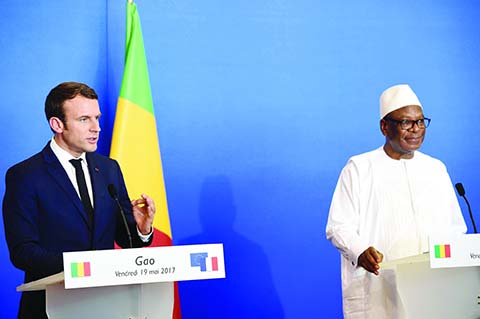 French President Emmanuel Macron (L) and Mali's President Ibrahim Boubacar Keita (R) hold a joint press conference on the sidelines of Macron's visit to the troops of France's Barkhane counter-terrorism operation in Africa's Sahel region in Gao, northern Mali, on May 19, 2017. The French President arrived on May 19 in conflict-torn Mali to visit French troops fighting jihadists on his first official trip outside Europe since taking power. / AFP / POOL / CHRISTOPHE PETIT TESSON
French President Emmanuel Macron (L) and Mali's President Ibrahim Boubacar Keita (R) hold a joint press conference on the sidelines of Macron's visit to the troops of France's Barkhane counter-terrorism operation in Africa's Sahel region in Gao, northern Mali, on May 19, 2017. The French President arrived on May 19 in conflict-torn Mali to visit French troops fighting jihadists on his first official trip outside Europe since taking power. / AFP / POOL / CHRISTOPHE PETIT TESSON
GAO, Mali: President Emmanuel Macron arrived yesterday in conflict-torn Mali to visit French troops fighting jihadists on his first official trip outside Europe since taking power. At the end of his first week in office, Macron flew into Gao, a city in Mali's deeply-troubled north, where he will hold talks with his Malian counterpart Ibrahim Boubacar Keita. He will also meet some of the 1,600 French soldiers stationed there, making it the largest base outside France.
The troops are part of Operation Barkhane, the counter-terror operation whose mission is to target jihadist groups operating in the Sahel region south of the Sahara. Set up in 2014, the operation comprises around 4,000 soldiers who are deployed across five countries-Mali, Mauritania, Niger, Chad and Burkina Faso.
Macron is travelling with Foreign Minister Jean-Yves Le Drian, who as the former defense minister knows Gao well, and his replacement in that job, Sylvie Goulard. The presence of French Development Agency (AFD) chief Remy Rioux in the president's entourage is taken as a sign that Macron wants to put more emphasis on economic development in its former colonies.
New approach?
"The purely military strategy has its limits," Florent Geel of the International Federation for Human Rights said. "No-one can deny the necessity of the security dimension of the strategy but it's clear that you cannot solve the issue of terrorism without taking into account other factors," he added. As he landed in Gao, Macron was met by Keita with whom he will hold talks on the fight against terrorism and the west African country's rocky path since a 2015 peace deal.
Northern Mali fell to jihadist groups linked to Al-Qaeda in March 2012 and a French-led military intervention the following year drove out the Islamists from key towns. But jihadists continue to roam the country's north and centre, mounting attacks on civilians and the army, as well as French and UN forces still stationed there. Macron was expected to emphasize the need for closer European cooperation in the fight against jihadists, especially with fellow EU heavyweight Germany, French officials said.
The new president discussed the issue with German Chancellor Angela Merkel in Berlin this week, during his first visit to a foreign leader since taking power. Germany currently contributes 550 troops to the multi-national UN force in Mali, called MINUSMA. Stationed there since July 2013, it has just over 12,000 military and police personnel working on what is considered the UN's most dangerous active peacekeeping deployment.
France wants a "new Franco-German impetus so that Europe plays a greater role in defense and security matters, especially in Africa and the Sahel," a source in Macron's team said. During his campaign, Macron spoke of his desire to re-calibrate France's role on the African continent. He was criticized at home by describing France's colonial war in Algeria as a "crime against humanity" and "genuinely barbaric". The comments were well-received in former colonies such as Algeria but condemned by Macron's far-right rival in the presidential vote, Marine Le Pen. - AFP

